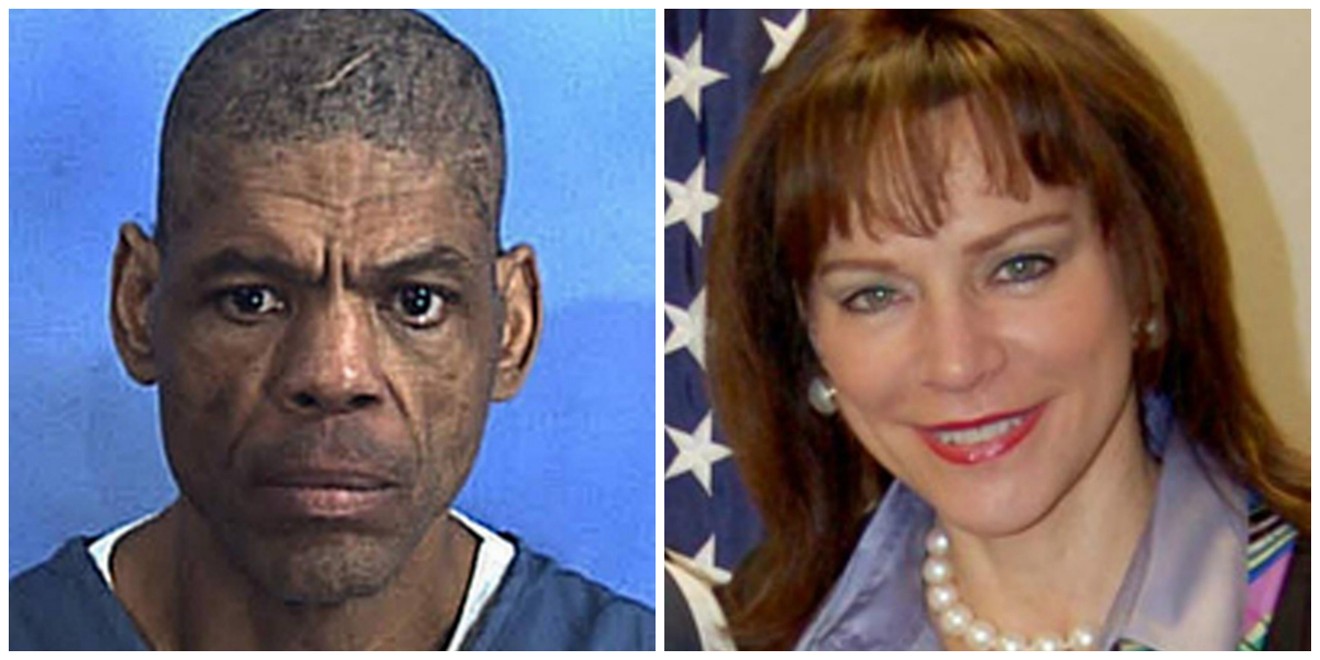Miami-Dade State Attorney Katherine Fernandez Rundle is responding aggressively to mounting criticism over her decision not to charge four prison guards who were allegedly involved in the death of schizophrenic prison inmate Darren Rainey.
In an unprecedented hourlong interview backed by her three top prosecutors, Rundle described in detail her abandonment of the case against the guards who escorted Rainey to a scalding-hot shower where he spent 90 minutes, allegedly screamed for help, and then suffered what she called “some kind of heart issue” before dying.
More than 620,000 people in the past few days have read New Times' story about Rainey's death, and thousands have reacted angrily. Sources even say Rundle has received death threats. In response, she has put up a website with evidence, created a hotline to hear people's concerns, and appeared on radio to defend the decision, which was announced late last Friday afternoon – just as most reporters were going home for the weekend.
“Nobody can condone someone being thrown into a hot shower and killed,” Rundle said. “We read the same thing everyone else did, but it wasn't until we really investigated that we learned that is not what happened.”
Rainey's death was first described by the Miami Herald's Julie K. Brown, who won a George Polk Award, one of journalism's most prestigious prizes, for her work. That was followed by Eyal Press' lengthy piece in the New Yorker. Rainey's family has alleged a coverup.
Rainey died June 23, 2012, at the Dade Correctional Institution near Florida City, where he was serving time for cocaine possession. Brown showed convincingly that he had been left in the extremely hot shower as punishment for defecating in his cell and refusing to clean it up. Witnesses, most centrally a fellow prisoner, convicted burglar Harold Hempstead (who was inexplicably transferred recently), claimed to have heard Rainey screaming repeatedly, “Please take me out! I can’t take it anymore!”
Florida Department of Corrections higherups' emails discussing how to describe the death were discovered later. And prison counselor Harriet Krzykowski gave the New Yorker other damning evidence that seemed to confirm that Rainey had been brutally murdered — and that she had been pressured to cover up evidence.
But Rundle and her chief assistants — Don Horn, Kathleen Hoague, and Esther Jacobo — say that “narrative” was false. They contend video in the prison and a re-creation of events, as well as public records, revealed that allegations by Hempstead, Krzykowski, and others would be virtually impossible to prove in court.
“We have to rely on the science in the case,” Rundle said. “The question for us is whether the actions that we could prove constituted manslaughter or murder.”
Four points in particular would have made the case difficult to prove, Rundle and her assistants say. Though many reports – including one published by New Times — alleged Rainey was burned to death, that was not confirmed in the coroner's findings, claimed the state attorney and Hoague, who led the investigation. Though the autopsy report said that there were red areas on Rainey's chest and extremities and that his skin was “coming off,” there were no burns on his body, according to that document. (The autopsy has been questioned by a New York State coroner, who says the skin slippage could only have been caused by scalding water.)
And the fellow prisoner Hempstead, whose description to Brown was particularly damning, said things that were contradicted in a timeline. He can be seen on video placing a piece of paper over his cell window, which would have precluded him from seeing things he described. Hempstead and others who said Rainey called desperately for help testified in ways that contradicted one another and did not match the timeline, prosecutors said.
Then there was the shower. It was a jerry-rigged nozzle in a nine-by-three-foot room. The prosecutors claimed that even if the water were exceedingly hot, Rainey could have stepped out of the way.
Finally, there was the temperature of Rainey's body. Several reports have said his body was "too high to register with a thermometer.” The prosecutors, though, said it was measured at 102 degrees after his death, before fire-rescue arrived.
“This doesn't relate to medieval scalding,” Horn said. Added Jacobo: “Unless the guards were in there holding him under the stream, it would have been impossible for him to get burned.”
Then Jacobo concluded, “The burden of proof for this is very high. We cannot prove a crime to a reasonable doubt. We cannot prove murder or manslaughter.”
[
{
"name": "Air - MediumRectangle - Inline Content - Mobile Display Size",
"component": "19274298",
"insertPoint": "2",
"requiredCountToDisplay": "2"
},{
"name": "Editor Picks",
"component": "17482312",
"insertPoint": "4",
"requiredCountToDisplay": "1"
},{
"name": "Inline Links",
"component": "18711090",
"insertPoint": "8th",
"startingPoint": 8,
"requiredCountToDisplay": "7",
"maxInsertions": 25
},{
"name": "Air - MediumRectangle - Combo - Inline Content",
"component": "17482310",
"insertPoint": "8th",
"startingPoint": 8,
"requiredCountToDisplay": "7",
"maxInsertions": 25
},{
"name": "Inline Links",
"component": "18711090",
"insertPoint": "8th",
"startingPoint": 12,
"requiredCountToDisplay": "11",
"maxInsertions": 25
},{
"name": "Air - Leaderboard Tower - Combo - Inline Content",
"component": "17482313",
"insertPoint": "8th",
"startingPoint": 12,
"requiredCountToDisplay": "11",
"maxInsertions": 25
}
]












